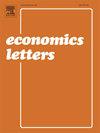心理健康和儿童税收抵免:支付方式的比较评估
IF 2.1
4区 经济学
Q2 ECONOMICS
引用次数: 0
摘要
扩大的儿童税收抵免(CTC)有可能改善有受抚养儿童的家庭的心理健康。本研究调查了CTC支付方式(按月分期付款与一次性等额支付)对低收入家庭(尤其是弱势群体)心理健康的影响。利用家庭脉搏调查的数据和三重差异分析,我们比较了这两种支付策略与四个关键心理健康指标之间的相关性:焦虑、担心、不感兴趣和情绪低落。结果表明,一次性支付与心理健康结果的显著改善有关。虽然每月付款可能会带来明显的、潜在的长期好处,但我们的研究结果强调了一次性付款对短期心理健康的好处。这些结果指出了支付策略在设计和实施旨在改善家庭福祉的财政支持计划中的重要性。本文章由计算机程序翻译,如有差异,请以英文原文为准。
Psychological well-being and child tax credit: Comparative assessment of payment approaches
The expanded Child Tax Credit (CTC) has the potential to improve the mental well-being of families with dependent children. This study investigates the impact of CTC disbursement methods – monthly installments versus a single, equivalent lump-sum payment – on the mental health of low-income households, a particularly vulnerable population. Using data from the Household Pulse Survey and a triple difference analysis, we compare the correlation between these two disbursement strategies and four key mental health indicators: anxiety, worry, disinterest, and down feeling. Results demonstrate that lump-sum disbursements are associated with significantly greater improvements in mental health outcomes. While monthly payments may offer distinct, potentially longer-term benefits, our findings highlight the superior short-term mental health outcomes associated with lump-sum disbursements. These results point to the importance of disbursement strategy in the design and implementation of financial support programs aimed at improving family well-being.
求助全文
通过发布文献求助,成功后即可免费获取论文全文。
去求助
来源期刊

Economics Letters
ECONOMICS-
CiteScore
3.20
自引率
5.00%
发文量
348
审稿时长
30 days
期刊介绍:
Many economists today are concerned by the proliferation of journals and the concomitant labyrinth of research to be conquered in order to reach the specific information they require. To combat this tendency, Economics Letters has been conceived and designed outside the realm of the traditional economics journal. As a Letters Journal, it consists of concise communications (letters) that provide a means of rapid and efficient dissemination of new results, models and methods in all fields of economic research.
 求助内容:
求助内容: 应助结果提醒方式:
应助结果提醒方式:


